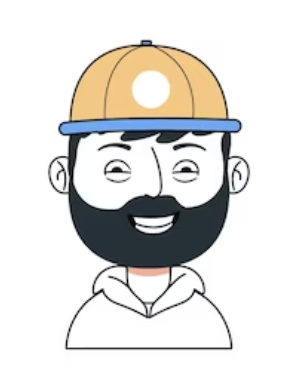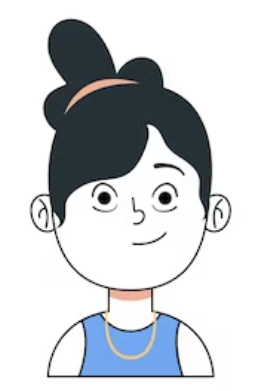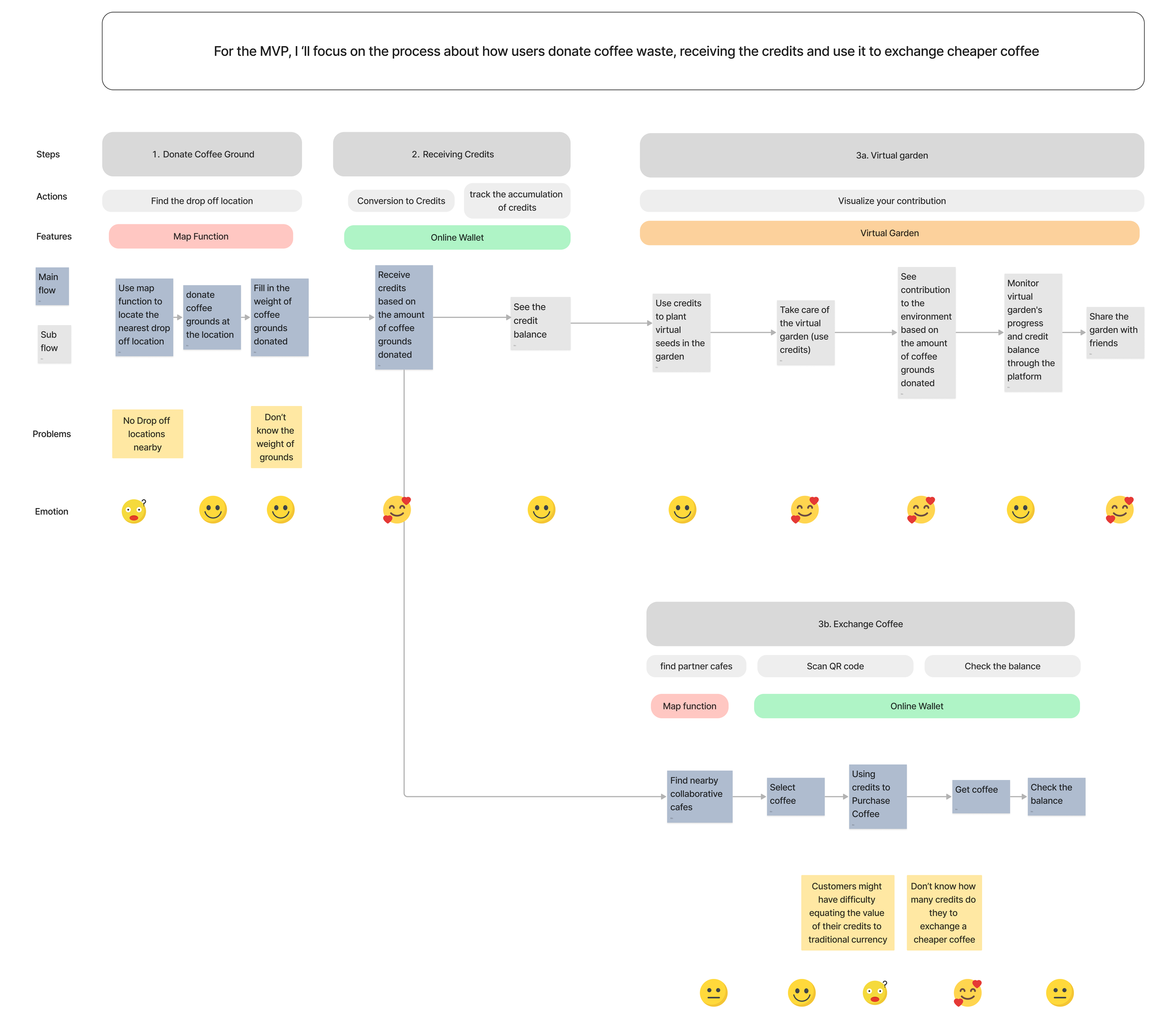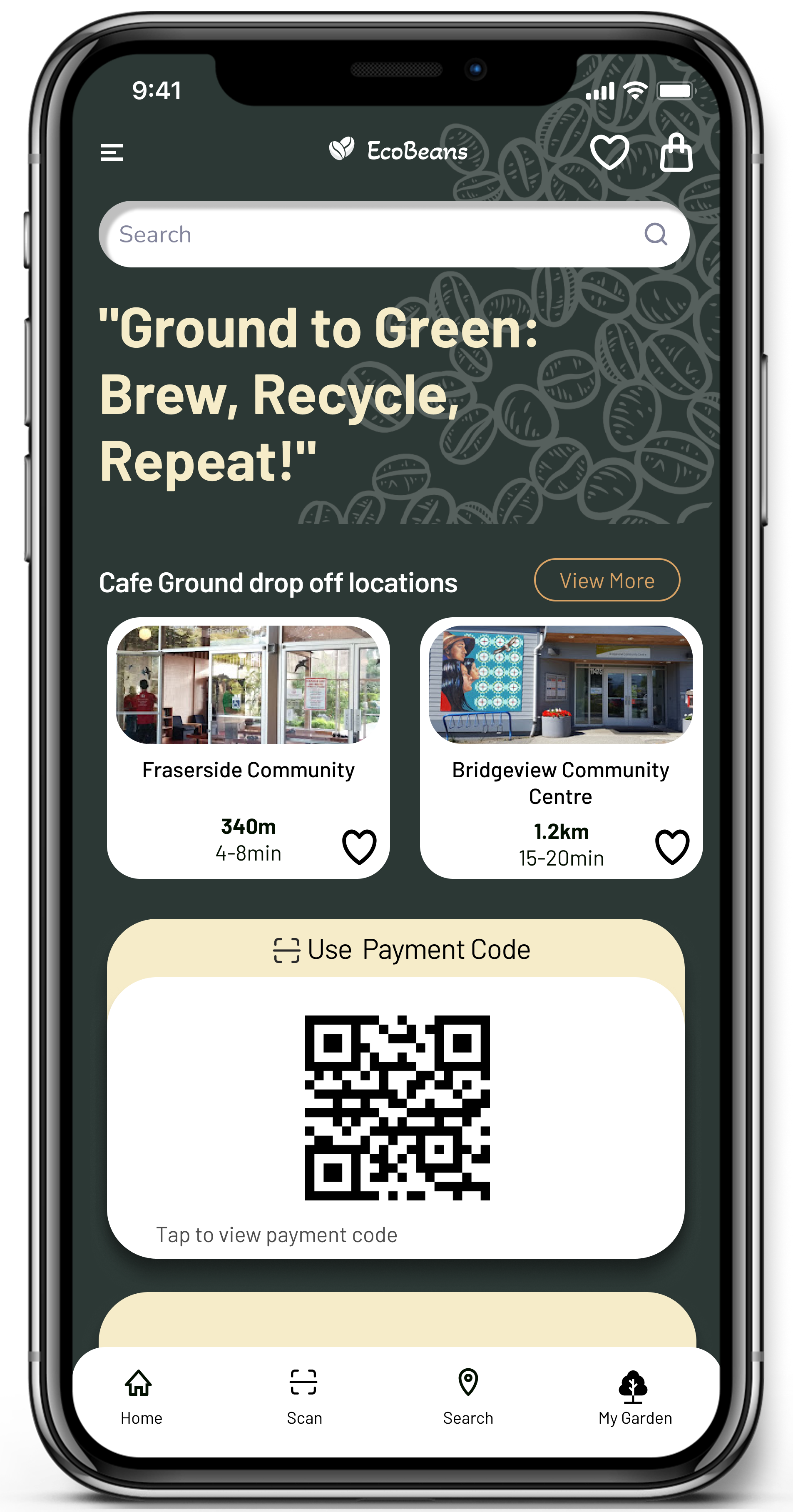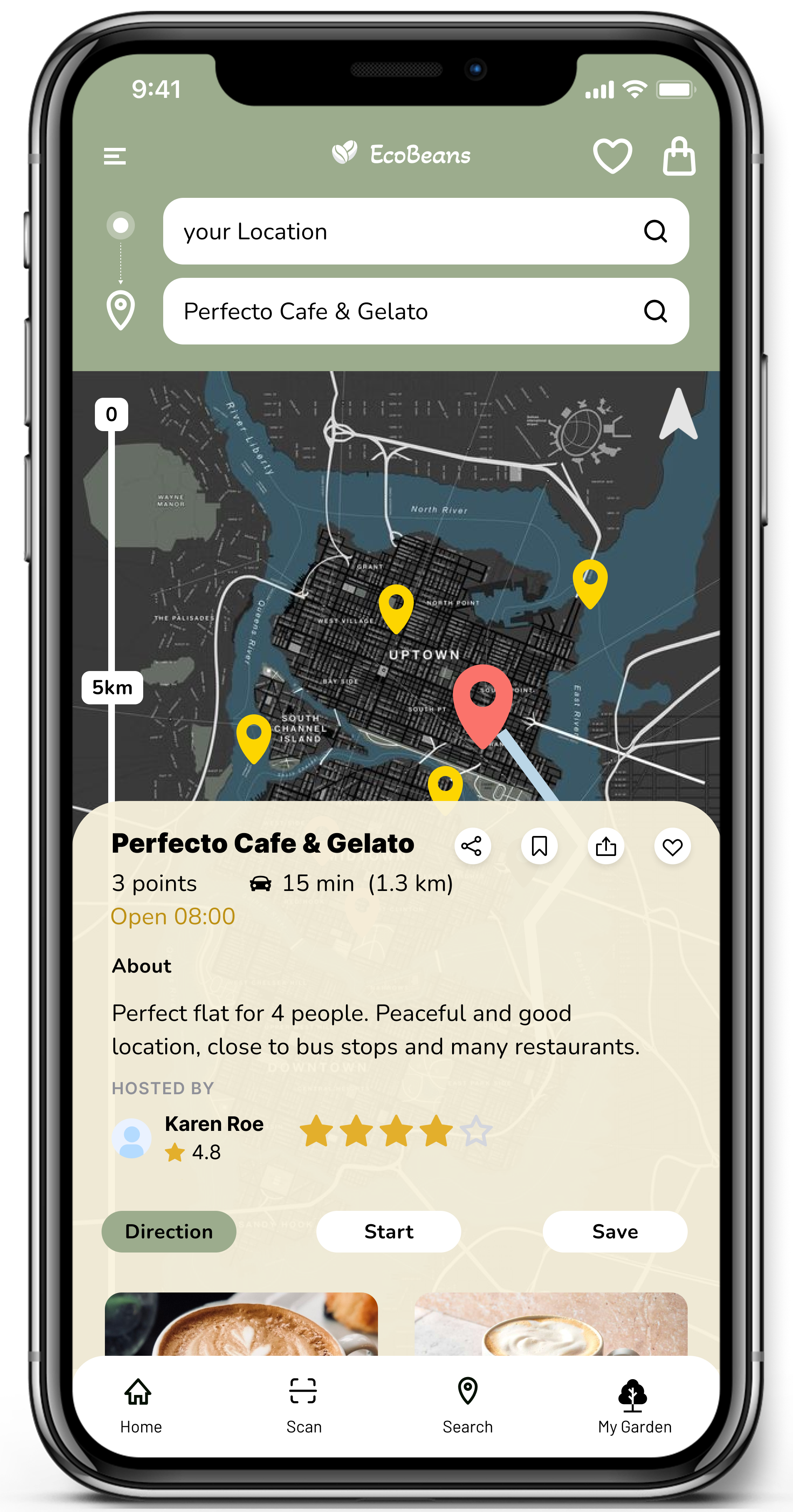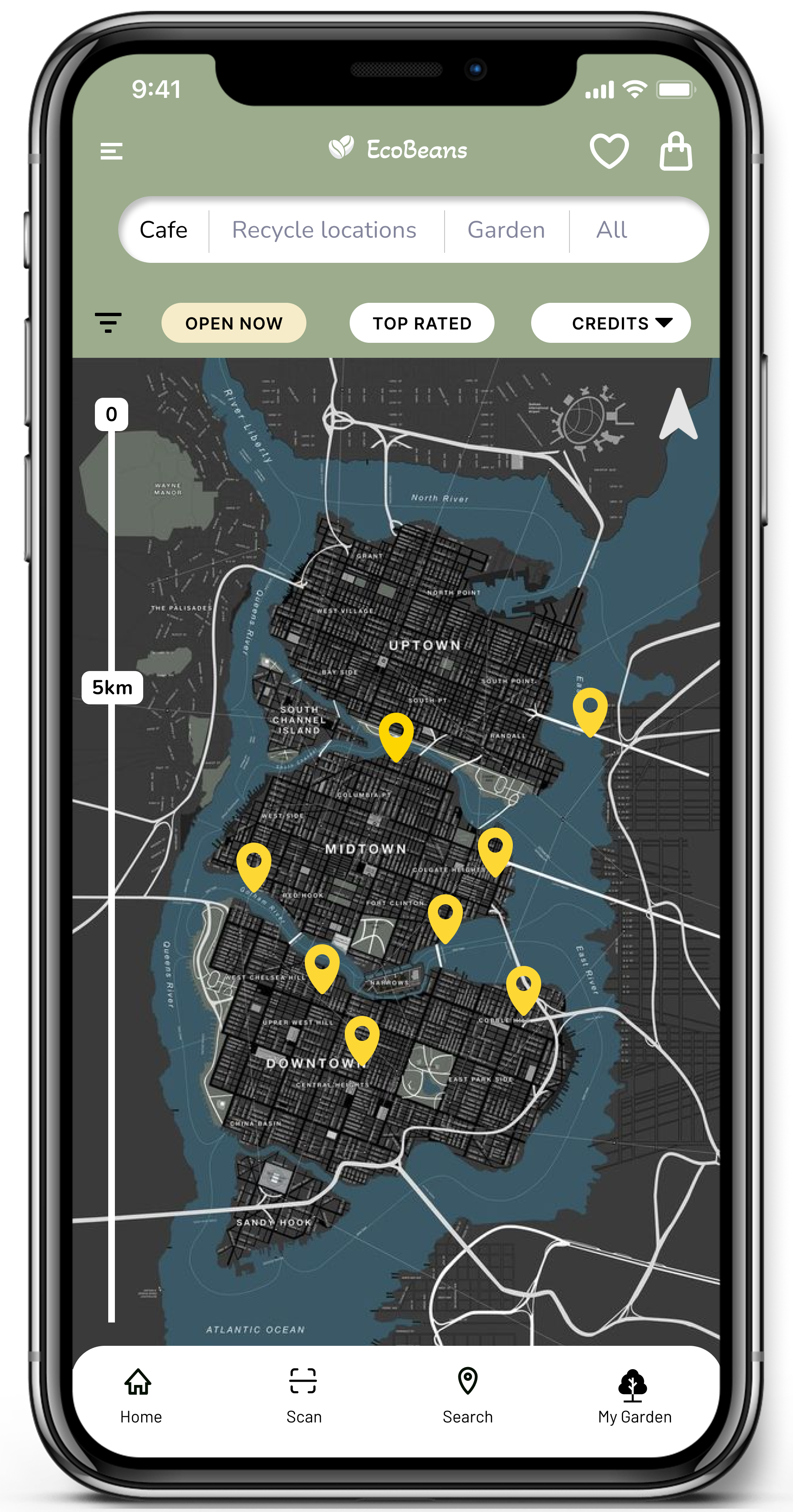
Eco-friendly
01 Overview
Coffee ground recycling
EcoBeans is an app that aims to create a circular economy for coffee grounds by proving services for the public to recycle coffee waste and renovate the public community garden as so to create more activities at the same time.
UX research and mobile UI design
Figma/Photoshop/AI
Individual contribution
7 weeks
UX Design
UI Design
My Role:
Tools:
Team:
Timeline:
When did it all begin?
As a coffee lover, I drink coffee on a daily basis, and every time I'd mindlessly dispose of the coffee waste (which is not great because it’s not sustainable!).
One day it got me thinking if there’s a way around this: a.k.a wondering where the coffee grounds go and if I could use them as fertilizer. I noticed community gardens in Vancouver are highly underutilized (which is sad because they add sustainable and aesthetic values). In this project, I aim to address the problems by creating an eco-friendly community space.
02 The Problem
How might we design an app that will encourage the public to recycle coffee grounds while increasing the utilization of community gardens?
From idea to MVP interface
2. Define
Pain points
Opportunities
1. Empathy
Broad research on coffee waste and community garden
Competitive analysis
Survey
Personas
3.Ideate
User journey
Information Architecture
Challenges
Considering the wide range of user groups and their behaviors, I spend a longer time on my information architecture and user research.
4.Prototype
Wireframe
Iteration
High-fidelity prototype
5.Test
Testing
03 Research
Comments about coffee ground
Margaret Atwood
Ah, the daily nectar from the gods. I’m a coffee lover, and the mere idea of giving up my morning (and noon, and 3 p.m., and 8 p.m.….) cup of joe gives me heart palpitations that totally aren’t related to caffeine, I swear. But unfortunately, the coffee trade isn’t easy on the Earth — Sustainable Business Toolkit reports that not only does the coffee trade cause deforestation, but the process of turning coffee cherries into ready-to-go ground coffee results in a lot of waste.
Before approaching design, it was necessary to understand the problems:
How do people look at coffee waste contamination?
How do people deposit coffee grounds?
Their needs with public community gardens.
Lorne Michaels
I’m a I'm surprised to learn about the severe pollution caused by coffee waste on our planet. It’s shamed to say that I drink at least two cups of coffee everyday
Margaret Atwood
Challenges and Opportunities
Global warming: Greenhouse gas 25 times more potent than carbon dioxide
Coffee ground waste: 9 million tonnes every year
Wrong way of disposal: Landfill contribute to methane emissions and pollute underground water
Challenges from lack of management and governance
Lack of activities
Limited space
"I had no idea that something as simple as coffee grounds could contribute to pollution. We really need to be more mindful of our daily habits and their impact on the environment."
Viola Desmond
Actually, the primary reason stops me drinking coffee is the price in Canada.
#01 Coffee Ground
Reuse valuable ingredients: caffeine, antioxidants, nitrogen, phosphorus, potassium, and acid
Coffee bean farming: Coffee ground waste is a great source of nutrients for coffee bean plants
#02 Community Garden
Socializing and community building: Community gardens can provide opportunities for Canadians to connect with others who share their interests and values.
Planting and harvesting: Many Canadians enjoy planting and harvesting their own fruits, vegetables, and herbs in community gardens.
Relaxing and enjoying nature: For some Canadians, community gardens are a place to relax and eliminate their pressure
#03 Coffee Enthusiasts
Budget: With the increasing price of coffee, there’s a need to find a balance between coffee and other living expenses
No access to the knowledge of coffee waste recycling
High pressure from work and competitive society: According to their 2019 survey, 23% of Canadians aged 15 or older reported high levels of perceived life stress, while 19% reported high levels of work-related stress.
Encouraging them to exchange lower-priced coffee by donating coffee waste
Public community gardens provide a place for people to socialize by planting together or conducting events to release stress
User Interviews
After deciding on the direction for addressing the problem, I went on to learn about my target audience’s experiences on coffee drinking and coffee grounds disposal.
Coffee enthusiasts
Target Users
Age range: 25-35 & 35-45
Number: 8
Educational level: Above the high school
Goals
1. Find out the needs of coffee enthusiasts
2. If they are interested in coffee ground disposal
3. How much do they care about eco-friendly
4. The need for new friends
Questions
How often do you drink coffee?
More than 3 cups every day
At least one cup every day
Several times a week
Rarely
What is the ratio of making coffee at home and going to a cafe respectively?
Mainly make coffee at home
Prefer to go to cafes
Mixed
What type of coffee do you usually drink?
Brewed
Espresso
Instant
Others
How do you currently dispose of your coffee grounds?
Are you aware that coffee grounds can be used as garden fertilizer?
Have you ever used coffee grounds in your garden or for plant fertilization?
Are you concerned about the environmental impact of coffee ground disposal?
Would you be interested in using a mobile app that helps you dispose of coffee grounds in an environmentally friendly way?
How active are you to go to the public garden every week?
Do you have a garden or plants at home?
What type of plants do you typically grow?
Do you currently use any other fertilizers for your garden or plants?
Would you be interested in receiving notifications or reminders about coffee ground disposal and gardening tips?
How much do you want to make new friends?
What features would you like to see in an app focused on coffee ground disposal for garden fertilization?
map, care about how far is it, drop off in the cafes
Is there anything else you would like to share or suggest regarding coffee ground disposal or gardening?
Key Findings
90% of people have no idea about the value of coffee waste, and just throw them in the sink or trash bin
More than 70% of participants make coffee at home
40% of people don’t care about how coffee waste affects the environment or related issues
10% try to use coffee waste for planting
More than 60% of people just water their plants, the rest of them buy fertilizer in the store
95% of participants are willing to learn more about coffee waste recycling knowledge
70% of interviewees want to make new friends.
90% of people surveyed are willing to donate coffee waste for benefits but don't want to go out of their way to drop it off.
Target Users
Coffee enthusiasts who are new to the city/country
“I’m an international student, at the beginning I felt really hard to blend into this society and didn’t have access to meet new friends.”
Coffee lovers who also care about their environment
“I’m a loyal advocate of environmental protection, but due to the lack of publicity of related knowledge. I am not sure what potential threat the environment may pose.”
Everyday people who drink “obligatory” daily coffee for work
“I always feel exhausted from overwhelming work and seek ways to effectively relieve stress.
#01 Persona
Sarah
“My life can’t without coffee, which helps me more focus on my work. But I don’t have my private life except work and take care of my kids. I also care about how can I contribute more for our planet. Environmental contamination is a severe issue now”
Name: Sarah
Age: 45
Job: Environmental consultant
Lifestyle: Outdoors, enjoying food
Hobbies: Gardening, coffee
Education level: Bachelor
Income: Moderate income.
Family: married and has two children
Needs: healthy work-life balance
Mental status: Long-term pressure due to her job, which has been affecting her mental health.
Location: Vancouver, Canada.
Personality: Caring, empathetic person
#02 Persona
About
Sarah has lived in Vancouver for more than 20 years. She’s a coffee lover, who drinks coffee at least 3 cups everyday. But the increasing price makes her annoyed. She got married at late 30 years old and have 2 kids after that, so she always feels exhausted trying balance her life and work. But it is hard for her to find a decent garden to take a breath near her home, at the same time she doesn’t know how to drive and her husband always busy her his job which makes it even harder to bring her kids to enjoy the nature.
Details
Eco-friendly
Coffee
Enjoy outdoor
Goals
Sensitive & Stress
Cheaper coffee: She wants to find cheaper coffee
Recourse: An app teaches her coffee waste recycling. And there are more accessible ways to learn more about environmental protection
Friendship: She wants to make more new friends
Entertainment: She wants to enjoy her private time escaping from the life and work
Frustrations
Budget: The pricy coffee makes her sad
Waste recycling: Feel confused about how to dispose of the coffee ground
Loneliness: She feels lonely. Because except for her family and co-workers, she doesn’t have friends
Resource: Google is her only way to acquire more knowledge about eco-friendly
Alex Chen
“The main reason I decided to study in Canada is that it is an eco-friendly country. But I always feel lonely, due to the barrier of language, finding is hard to integrate with local people.”
Name: Alex Chen
Age: 22
Job: Student
Lifestyle: Study, coffee adventure, environmental engagement
Hobbies: Game, reading
Education level: Bachelor
Income: No
Family: Single
Needs: Make more friends
Mental status: Long-term pressure due to her job, which has been affecting her mental health.
Location: Vancouver, Canada.
Personality: Outgoing and friendly young man
About
Alex Chen is a 22-year-old international student who's passionate about two things: coffee and the environment. Juggling a tight budget, Alex navigates life with infectious optimism. He's on a mission to make friends who share his interests, explore the world of coffee on a shoestring budget, and champion environmental protection in Vancouver.
Details
Eco-friendly
Coffee
Make friends
Goals
Lonelyness
Making new Friends: His primary goal is to expand his social circle and make lasting friendships
Enjoy more coffee within the budget: Despite his financial limitations, Alex hopes he can enjoy more coffee everyday
Promoting environmental awareness: He aspires to spread awareness about waste contamination and encourage sustainable practices among his peers and within his community
Frustrations
Financial constraints: He feels the pinch of his limited budget. He's always on the lookout for cost-effective ways to enjoy coffee
Loneliness: Being in a foreign country can sometimes leave him feeling isolated and homesick
Environmental concerns: He often finds it disheartening to see the lack of awareness and effort towards sustainability around hi
User Pain points
Low budget
How to get cheaper coffee
Feel lonely
Few opportunities to make new friends
No access
There is a lack of attractive ways to learn about coffee ground recycling
04 Design Stage
Based on the results of research, I came up with 3 main features that want to persue in the app:
Business Model
Considering the feasibility of the whole recycle loop, this flow explains the process from donating the coffee grounds to how can they enjoy the cheaper coffee.
Map: Search drop-off locations, collaborative cafes, and community gardens
Payment: Use credits to exchange cheaper coffee
My Garden: Visualize contribution, join activities or launch activities
Learn: Educational coffee waste or planting tips
Information Architecture
MVP
Wireframe
QR Code Payment- Free/Cheaper Coffee
Find nearby cafe ground drop off locations or donate your coffee waste to collaborated cafe
Launch activities- In the visual garden, you can also launch activities in the real community garden
Virtual Garden- Visualize your amount of coffee ground donation and build your own private garden
Main page of visual garden
Locate the cafe, check the description and use the guide function to find the location
Invitate friends or make new friends to visite your garden and buy new plants by using credits
The coffee grounds donated is transferred into credits which can be used to pay for coffee. Users can also check their balances easily
Map Function-Locate drop off locations,gardens and collaborative cafes
Find your locations by map function
Or choose your coffee by keywords and distance
Take care of your garden and complete daily tasks
Learn- Different categories of coffee ground recycling information are provided in this section












